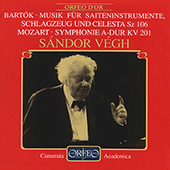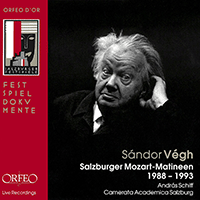Sándor Végh
Hungarian Sándor Végh studied in Budapest with Hubay and Kodály and was a founder member of the Hungarian String Quartet which premiered Bartók’s String Quartet No. 5 in 1935. In 1940 he formed his own quartet which, as well as giving concerts until the mid-1970s, recorded complete cycles of Beethoven and Bartók quartets. He initiated the International Chamber Music Festival of Cervo in 1962 and formed the Sándor Végh Chamber Orchestra. In 1972 he helped establish the International Musicians’ Seminar at Prussia Cove, Cornwall, which enabled British musicians to deepen their understanding of European traditions and encouraged them in the belief that being a musician was a worthy occupation.
Solo appearances were never a large feature of Végh’s career but the few records he made in this capacity testify to his calibre as an interpreter. His unaccompanied Bach is perhaps rather slow and prone to heaviness, typical of many mid-twentieth-century players, but in Beethoven’s Sonata No. 4, Op. 23 (1982) this affords certainty and gravitas. His vibrato is reasonably controlled for the period, yet rather wide and powerful for those more in step with historical practices nowadays.
Végh’s connections with the composer lend importance to his Bartók recordings. There is considerable vitality and humour in his 1981 recording of Duos 35–44 with Menuhin as part of a Wigmore Hall lecture, but the technical capacities of both players were waning by this time. His studio recording with Lysy in 1971 gives a much fairer account, although again there is some heaviness pervading Bartók’s complex, dance-like textures.
As leader of the Végh Quartet he produced some of his finest recordings including complete Bartók cycles in 1954–1956 and 1970. The earlier recording of the Quartet No. 5 is highly distinguished and emotive, the edges of Bartók’s sometimes angular writing being softened by a richly romantic sound, laden with vibrato and some prominent portamenti. Although many will prefer the Lindsay Quartet’s famous performances from 1981 (which arguably grant the works greater psychological depth and grittiness), the Végh Quartet’s are amongst the most persuasive renditions of these extraordinary works. Of Beethoven’s equally towering quartet oeuvre, the Végh Quartet’s 1952 recording of Op. 131 should be heeded. In many ways a quite modern rendition it is full of significance and intensity; this style remains remarkably similar in their 1973 recording of the same work.
As accuracy of technique and projection of a large sound were increasingly considered important, Végh’s subjective approach emphasised artistry and rhetoric over virtuosity, his activities as a chamber musician, conductor and teacher influencing a generation of musicians.
© Naxos Rights International Ltd. — David Milsom (A–Z of String Players, Naxos 8.558081-84)



















